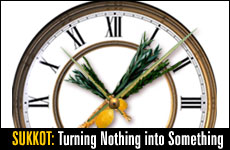 Iran’s Attack on Israel
Iran’s Attack on Israel


4 min read
Sukkot is about finding what would otherwise be thrown away and wasted, and injecting it with purpose.
I was recently at a event. It was a siyum, a special meal to commemorate the completion of a significant portion of Torah. In that sense, it was like many of these celebrations that I had been to over the years. But what made it was that it commemorated someone finishing an entire chapter of Talmud by heart, and that every piece in the entire chapter was learned at least 400 times!
The man who completed this colossal task was not a great Torah scholar with dozens of years in an institute of higher Torah learning under his belt, but rather a man who until 15 years ago had no Torah background whatsoever. It was simply a man who had more determination than rhetoric, more willpower than excuses, and the humility to understand that he couldn't build Rome in a day.
He is a world-renowned physician who has a practice that consumes enormous amounts of time, while simultaneously being a devoted father and husband, and an active leader in community organizations. Where was he going to find the time to finish a chapter of Talmud 400 times, a feat that he estimated would take a minimum of 800 hours?
In his remarks at the siyum, he told us that his solution was to look for "dead time" in his day, and to put it to use. He calculated that he had close to 100 minutes a day of dead time. These included: seven minutes driving to the hospital, six minutes walking to elevator, one minute waiting for elevator, four minutes walking the floor between surgery rooms, seven minutes getting back to car, 15 minutes driving to office, 15 minutes driving home, and many more assorted minutes waiting on line at grocery stores, in waiting rooms, and while running errands.
As I listened to him talk I started thinking about all the "dead time" in my life. Time is the most precious commodity in the world. Bill Gates, Warren Buffet, and Rupert Murdoch with all their money cannot buy a single extra minute of life over their allotted lifespan. Time has a very limited supply, and an enormous demand, yet we waste so much of it that we discuss how we are going to "kill time." Bertrand Russell even glorified this idea in his famous quote, "The time you enjoy wasting is not wasted time."
"If time be of all things the most precious, wasting time must be the greatest prodigality." –Ben Franklin
The holiday of Sukkot can help us inject our "dead time" with meaning. It's a time when we take a step back from normal life and enter the Sukkah, a dwelling that represents a different kind of living. It is a place where we go back to the basics, and strip away some of the physical accoutrements that surround us all year long. When we take away all the extras, we can focus on what really is important in our lives. When we know what really matters, life becomes too precious to waste, and we are motivated to make every moment count.
The physical makeup of the sukkah itself teaches us this lesson. The Talmud tells us that the schach, the roofing for the sukkah, is to be made of psoles goren v'yekev, the refuse of the threshing floor and wine vat (the stalks and vines left over after processing wheat and grapes). This is material that normally is seen as inconsequential and thrown out. However on Sukkot we turn it into the roof of our sukkah, the most important part of the sukkah! Sukkot is about finding what would otherwise be thrown away and wasted, and using it instead for holiness.
Imagine if we were to use the time in our car to call one elderly person a day, and ask them how they are doing, or if while waiting for our computer to boot up we read one piece from a Jewish book we keep in our office, or if while waiting in line at the grocery store, we read one article from Aish.com on our palm (see www.avantgo.com to add this feature). Wouldn't we be changing our "dead time" to "live time"?
This Sukkot when we enter that purposely minimalist structure, the sukkah, let us focus on finding the unessential parts of our life and turn them into productive, gainful, and rewarding times.
